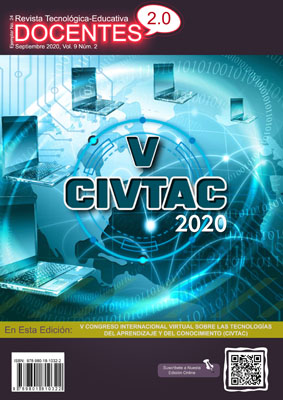Development of Communicative Production Competencies and Textual Understanding
 DOI:
https://doi.org/10.37843/rted.v9i2.159
DOI:
https://doi.org/10.37843/rted.v9i2.159
Main Article Content
Abstract
The following research was carried out under the observation, diagnosis, as well as the planning and analysis of a process that aims to strengthen the development of production communication skills such as textual comprehension in elementary school students. It began with a diagnosis of the students' reading-writing level, then the design of a pedagogical intervention proposal based on these results; subsequently, the effect of the intervention proposal on the processes of text comprehension - textual production was evaluated. The research was developed under the qualitative approach and action research design, since they are the most successful in education because teachers have the possibility of inquiring about their own pedagogical exercise; analyze and understand it, as, the main instrument: self-reflection. In turn, ICTs were involved, with striking activities that not only allowed the acquisition of necessary information, but also active learning through the development of skills such as: consultation and information management, development of the critical level, resolution of situations and decision making. decisions, creativity, and innovation. As a result of the above, various activities and strategies were designed that made it possible to strengthen, expand the lexicon, work on grammatical aspects, coherence, cohesion applied to different kinds of texts, which contributed to the improvement of these processes. In conclusion, the intervention implemented notably improved the performance of the students, had significant effects on academic performance, improved the reading-writing process, generated the habit of reading, in turn allowed a dynamic participation of the entire educational community.
Downloads
Metrics
Article Details

This work is licensed under a Creative Commons Attribution-NonCommercial-NoDerivatives 4.0 International License.
Those authors who have publications in our journal accept the following terms:
- When a work is accepted for publication, the author retains rights of reproduction, distribution of his/her article for exploitation in all countries of the world in the format provided by our magazine and any other magnetic medium, optical, and digital.
- Authors will retain their copyright and guarantee the journal the right first to publish their work, which will be simultaneously subject to the Creative Commons Acknowledgment License (Attribution-NonCommercial-NoDerivatives 4.0 International (CC BY-NC-ND 4.0)). That allows third parties to copy and redistribute the material in any medium or format, under the following conditions: Acknowledgment - You must properly acknowledge authorship, provide a link to the license, and indicate if any changes have been made. You may do so in any reasonable way, but not in a way that suggests you have the licensor's endorsement or receive it for your use. NonCommercial - You may not use the material for a commercial purpose. NoDerivatives - If you remix, transform, or build from the material, you cannot broadcast the modified material. There are no additional restrictions - You cannot apply legal terms or technological measures that legally restrict you from doing what the license allows.
- Authors may adopt other non-exclusive license agreements to distribute the published version of the work (e.g., deposit it in an institutional archive or publish it in a monographic volume) provided that the initial publication in this journal is indicated.
- Authors are allowed and recommended to disseminate their work through the Internet (e.g., in institutional telematic archives, repositories, libraries, or their website), producing exciting exchanges and increasing the published work's citations.
- Request of withdrawal an article has to be done in writing by the author to the Editor, becoming effective after a written response from the Editor. For this purpose, the author or authors will send correspondence via e-mail: [email protected].
- The author will not receive financial compensation for the publication of his work.
- All Docentes 2.0 Journal publications are under the Open Journal System (OJS) platform at: https://ojs.docentes20.com/.
References
Carr, W. y Kemis, S. (1988). Teoría crítica de la enseñanza. La acción en la formación del profesorado. Barcelona: Martínez Roca. CHACÓN, M.
Elliott, J. (1990). La investigación-acción en educación. Morata.
García, W. & Jaramillo, N. (2020). Las tecnologías del aprendizaje y la comunicación (TAC) en el marco de la profesionalización docente UNAE-Morona Santiago. Revista Tecnológica-Educativa Docentes 2.0, 9(1), 12-16.
Martinez, M. (2000). La investigación Cualitativa etnográfica en educación. Trillas.
Mayorga, M. (2020). Conocimiento, Aplicación e Integración de las TIC –TAC y TEP por los Docentes Universitarios de la Ciudad de Ambato. Revista Tecnológica-Educativa Docentes 2.0, 9(1), 5-1
Mayorga, M. (2020). Conocimiento, aplicación e integración de las TIC – TAC y TEP por los docentes universitarios de la ciudad de Ambato. Revista Tecnológica-Educativa Docentes 2.0, 9(1), 5-11. https://doi.org/10.37843/rted.v9i1.101
MEN. (1994). Ley 115 de febrero 8 de 1994. Recuperado de: http://www.oei.es/quipu/colombia/Ley_115_1994.pdf
MEN. (2006). Resultados ISCE. Bogotá: MEN. Recuperado de: http://www.mineducacion.gov.co/1621/articles-345504_anexo_13.pdf
MEN. (2007). Investigación de los saberes pedagógicos. Recuperado de: http://www.mineducacion.gov.co/1621/articles-345504_anexo_13.pdf
MEN. (2006). Estándares Básicos de Competencias. Recuperado de: http://www.mineducacion.gov.co/1621/articles-345504_anexo_13.pdf
MEN. (2006). Estándares Básicos de Competencias. Recuperado de: http://www.mineducacion.gov.co/1621/articles-345504_anexo_13.pdf
MEN. (2009). El deal educativo del nuevo siglo. Al tableo, pág. 1.
Ministerio de educación. (26 de febrero de 2016). Colombia Aprende. Recuperado de: http://aprende.colombiaaprende.edu.co/es/agenda/noticias/estrategias-para-desarrollar-la-comprensi%C3%B3n-lectora
Mujica, R. (2019). ¿Cómo organizar una Aula Invertida? Revista Tecnológica-Educativa Docentes 2.0, 5(1), 7-8. Recuperado de: https://ojs.docentes20.com/index.php/revista-docentes20/article/view/67
Murillo, F. (2010). Métodos de Investigación Acción. 3º edición. Editorial Especias
Sandin, E. (2000). Criterios de validez en la investigación cualitativa. Revista de la investigación cualitativa, 20.
Sierra, H. (2013). El aprendizaje active como mejora de las actitudes de los estudiantes hacia el aprendizaje. Recuperado de: https://academica-e.unavarra.es/bitstream/handle/2454/9834/TFM%20HELENA%20SIERRA.pdf
Torrecilla, F. (2010). Investigación acción. Recuperado de: https://www.uam.es/personal_pdi/stmaria/jmurillo/InvestigacionEE/Presentaciones/Curso_10/Inv_accion_trabajo.pdf






